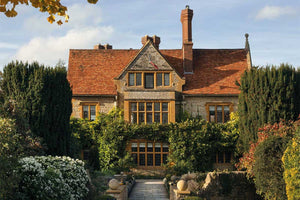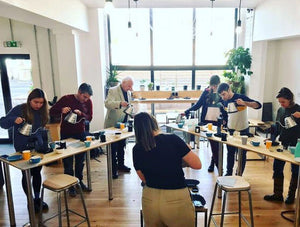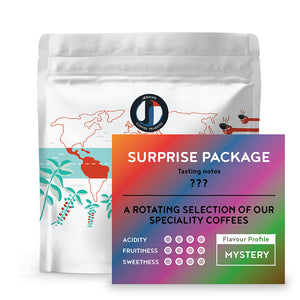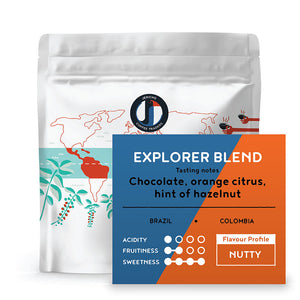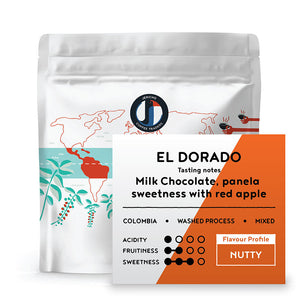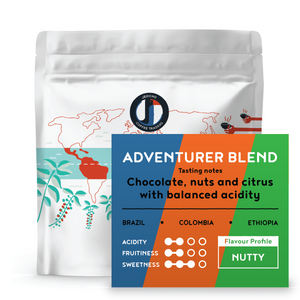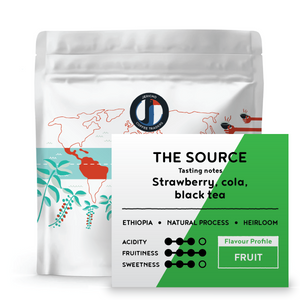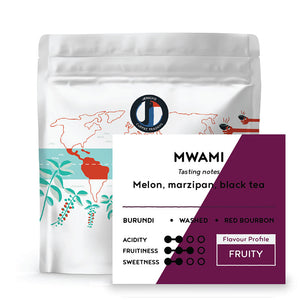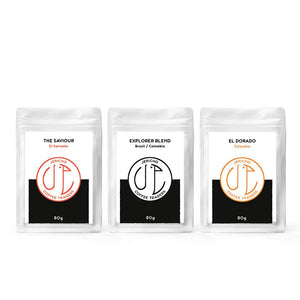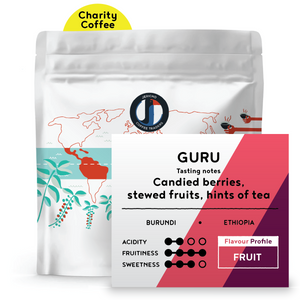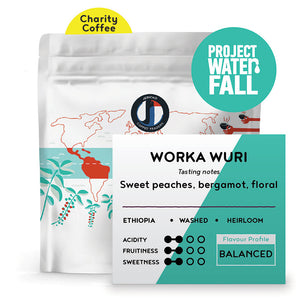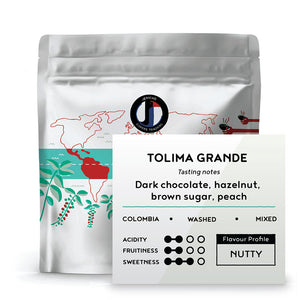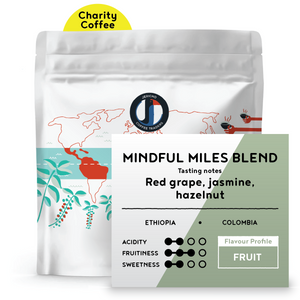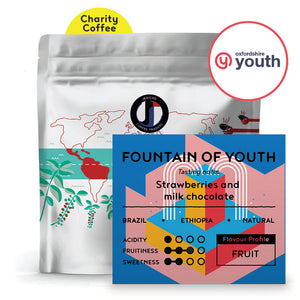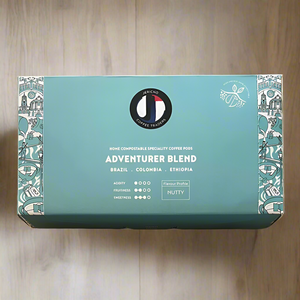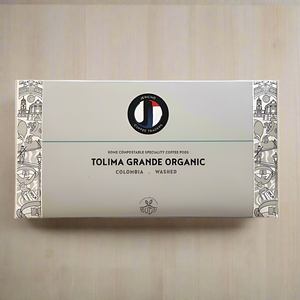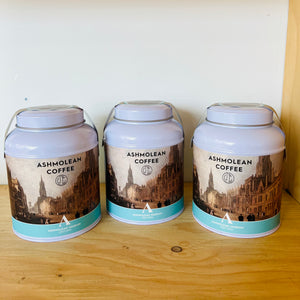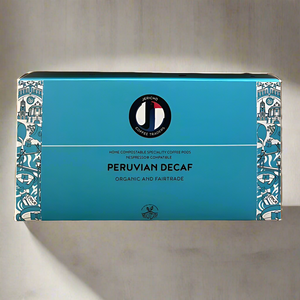From bean to cup: a roaster's journey
Apr 25, 2023
Even if you've been subscribing to our speciality coffee for some time, you may not be aware of how we choose, source and process the coffee beans that eventually arrive in your cup. It's a fascinating journey!
With a focus on ethical sourcing and support for coffee farmers and charities worldwide, Jericho Coffee Traders has become a firm favourite among speciality coffee enthusiasts.
And what better way to share the mystery of how our green coffee beans become your morning brew than to ask our resident expert, James Armitage, one of the founders of Jericho Coffee Traders.
I had the pleasure of chatting with James recently to learn more about the bean-to-cup journey and what makes its coffee special.
On ethics and green bean sourcing...
Andy: You've very proud of your support for family-run farms, co-operatives and charities. Please explain more about this approach and why it's so important to you?
James: The ethical approach is a no-brainer for me. We want farmers, their families and communities to be rewarded appropriately for what they do. The passion, commitment and energy they put into growing amazing coffee allow us to do what we do each day.
There are guys wearing suits in Zurich, earning a small fortune each year, who can change the lives of whole coffee-farming communities with the click of their computer mouse. That change could be positive, but unfortunately, often it's not; the world can be so incredibly unjust.
We know that many of our customers share our passion for supporting our coffee growers, even if that means spending a little more!
Andy: If you could change just one thing in the coffee industry that would improve the lives of coffee farmers, what would that be?
James: Can I have two? My first dream change - a big one - would be to stop global warming and the diminishing land available to grow Arabica coffee beans. My second - arguably more achievable - would be to change the attitudes of the massive companies that buy coffee as cheaply as possible to reward their balance sheets and shareholders. I'd want to help them establish a new model where they reward their coffee suppliers rather than impoverish them.
Andy: You've often mentioned your B Corp aspirations. How has that progressed?
James: In principle, B Corp Certification makes sense as it's designed to ensure businesses meet high standards, particularly for employee benefits, charitable giving and supply chain practices. However, it's a big commitment to achieve B Corp certification - financially and otherwise.
Recently, some companies granted certification have put the whole movement (in my eyes) into a little grey area. I started our B Corp journey as our values and ethics aligned nicely with it. Now when I look at some of the companies being certified, I'm struggling to see the same alignment.
I want to let the dust settle and see where it all goes. Then, I'm sure we'll pick up our B Corp journey again.
Andy: Closer to home, you're an advocate of the Living Wage as an employer. What does that mean, and why is this important to you?
James: The Living Wage means we pay our staff based on the cost of living in the UK rather than any other lesser measure. It's so they can afford to meet their everyday expenditure.
We have an exceptional team, and we ask a lot of them. Producing great coffee isn't 'unskilled labour'. They need to learn and practice their skills so we, and our customers, get the most from their coffee. They need to be presentable; they need to be personable; they need to understand Health & Safety policies.
This is particularly important for our baristas: there's so much more to being a barista than can be rewarded on anything near the minimum wage. Ultimately, they also need to be able to survive financially in a really expensive world!
Andy: How do you select the green beans you source? Does how they are cultivated, harvested & processed affect your decision?
James: We receive samples of green beans from a variety of sources. Ultimately, we're looking at the end result and how each coffee will sit within our coffee range. We have expectations around the flavour profiles of the beans from different regions.
Ideally, we want a consistent offer from each region that we represent. So, in addition to the nine flavour profiles we constantly offer, we give ourselves room to have three entirely different coffees available. These will usually be varietals from one region grown somewhere else in the world or a bean processed in a totally original way. This gives us room to have some fun and let our customers experience different, interesting coffees!
Andy: Do you purchase direct from farms, via an importer or both? Why have your chosen your sourcing channels?
James: We'd love to do more buying direct from farms, although this can leave them, and us, in a slightly exposed situation if things go wrong between the farm and roastery.
So, our largest crop comes from the Costa family farms in Brazil (not to be confused with the Costa Coffee brand!). Bruna, who is part of the Costa family, lives in London, so we have a close personal connection with her. We recently signed a deal to become the official coffee supplier of the Royal Albert Hall, so Stretch, our head roaster, and I met up with Bruna there to drink her family coffee. It was a lovely moment for all of us!
Andy: Do you have a preference for wet or dry processed beans? If so, why?
James: Personally, I prefer coffee from washed beans in the morning and then a fruity, dry-processed coffee in the afternoon. This is because I find a washed coffee has more of a 'utilitarian' role in my life - getting me going for the day - and follow that with a more 'experiential' coffee in the afternoon, generally as a filter coffee and consumed while doing some work or reading.
Andy: Do you have a preference for any coffee-growing regions or countries?
James: Again, this depends on the time of day! I'm a Central/South American guy in the mornings and an East African guy in the afternoons!
On roasting & roast profiles...
Andy: What is your quality control process for the green beans you receive?
James: We receive our green beans 'little and often' for micro-roasting to ensure the freshness of the coffee we produce. The beans are stored in ideal conditions in purpose-built warehouses before they come to us. We have the coffee in our roastery for as short a time as possible before it is roasted and sealed for customer delivery.
Every Friday morning, we have a tasting or 'cupping' session to assess how our coffees are tracking and responding in the roaster. Any of our team is welcome to join in and provide feedback. It's an excellent opportunity to brainstorm new ideas around our coffees.
Andy: Explain your roasting process and its history
James: We started roasting in 2013 in a large garage behind a curry house in Jericho, Oxford. It's the sort of world where you're learning all the time. Over the years, we've had several roasters come and work for the business. They've all brought their own ideas to the table - some good, some not so good! So it's been a process of working their best ideas into our business to ensure our coffee is the best it can be.
During the Coronavirus pandemic and the growth of our subscription customers, we struggled to keep up with demand! We had a 6kg batch-size roaster which was just too small for the job. So, we upsized it to a Giesen 15kg batch-size roaster. The Giesen has given us enough capacity for our current demand and our forecasted growth for the next 18-24 months! It's in a classic Porsche Miami 'baby' blue colour, so it's lovely to look at too!
In addition to the Giesen, we also have a small sample roaster, developed in New Zealand, which roasts 120 grams at a time and has great control over the roast dynamics. This is a decent sample size, but not so big that we 'burn' through sacks of green beans while we develop the perfect roast profiles.
Andy: OK. You lost me at roast profiles! What is a roast profile, and how does that affect the beans and the flavour in the cup?
James: Each coffee will respond differently in the roaster. We have certain expectations of how a coffee will respond, but some can surprise us! I could spend hours on this topic...but, in summary, the less you roast a bean, the more acidic the flavour will be in the cup. The longer the bean is roasted, the more bitter the flavour will be.
There's a sweet spot in roasting where the acids are converted to sugars.That's where we like to present our coffees.
Andy: Does the roasting process change depending on the green beans being roasted? If so, how?
James: Yes! Varietal changes, altitude changes, differing terroir, length of time since harvest and, most importantly, the processing method, all affect how we'll approach a green bean in the roaster.
A really high-altitude coffee will be wound up extremely tightly: the lack of oxygen at altitude means the beans struggle for growth, resulting in a really tight cellular structure in the bean. The low oxygen level also results in a higher level of lactic acid. That gives us more opportunity to present a really flavoursome coffee.
We've just got to get the roast right to really help it shine in the cup!
Andy: What are the benefits to your customers of micro-roasting rather than massive-batch roasting like the big coffee companies?
James: This is our area of the market! We're buying quality, expensive green beans and helping them reach their potential as an exceptional cup of coffee.
We roast in small batches to react and change as the crop changes. The other extreme would be to buy cheap greens and roast them darkly in massive batches to produce a generic product. That would be a better approach financially, but that's not what gets us out of bed every day!
Andy: Why do specific beans lend themselves to a particular grind and brewing method? What are your ideal pairings?
James: There are definitely different origins that lend themselves to a particular brewing method and roasting style.
I find coffees from Brazil or Central America (El Dorado, Maya, The Saviour) lend themselves to an espresso machine. They tend to be easier to use and more sympathetic to espresso brew errors. On the other hand, I think the fruity East African (Kahawa, The Source, Mwami) are better suited to a filter brew.
Having said all that...the great thing about coffee drinking is that everyone has their own preferences - it's all totally subjective!
Andy: Any final words for your customers?
James: We have a family and community focus and want to continue to develop that. We consider all our staff, partners and customers to be part of a larger coffee family, and we'd really like them to share our ethics and beliefs.
We didn't set up Jericho Coffee Traders solely as a business for financial gain: we're here to enjoy what we're doing and to make sure everyone involved feels valued and respected!



